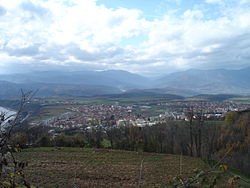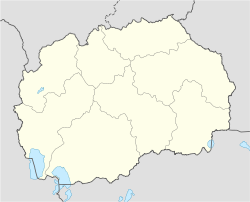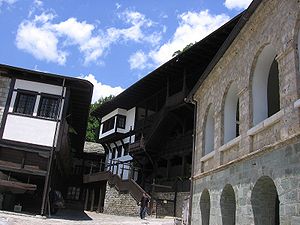- Debar
-
Debar
Дебaр
Dibra— Town — Debar with Debar Lake to the left Location within Macedonia Coordinates: 41°31′N 20°32′E / 41.517°N 20.533°E Country  Macedonia
MacedoniaMunicipality Debar municipality Government - Mayor Argëtim Fida Population (2002) - Total 19,542 Time zone CET (UTC+1) - Summer (DST) CEST (UTC+2) Postal code 1250 Website www.dibra.gov.mk/ Debar (Macedonian: Дебaр [ˈdɛːbar] (
 listen); Albanian: Dibra) is a city in the western part of the Republic of Macedonia, near the border with Albania, on the road from Struga to Gostivar. It is the seat of Debar Municipality.
listen); Albanian: Dibra) is a city in the western part of the Republic of Macedonia, near the border with Albania, on the road from Struga to Gostivar. It is the seat of Debar Municipality.Contents
Geography
Debar is surrounded by the Dešat, Stogovo, Jablanica and Bistra mountains. It is located 625 meters above sea level, next to Lake Debar, the Black Drin River and its smaller break-off river, Radika.
Population
According to the last census data from 2002, Debar has a population of 19,542,made up of 11,348 (58.52%) Albanians, 3,911 (20.11%) Macedonians, 2,684 (13.80%) Turks, 1,080 (5.55%) Roma, and 519 (2.67%) others.[1]
Name
The name of the city in Macedonian is Debar (Дебар), in Albanian Dibër or Dibra, in Serbian Debar (Дебар), in Bulgarian Debar (Дебър), in Turkish Debre or Debre-i Bala and in Greek, Divrē (Δίβρη) or Divra (Δίβρα).
History
The first recorded document mentioning Debar is the map of Ptolemy, dating around the middle of the 2nd century, in which it is called Deborus. The Byzantine emperor Basil II knew of its existence, and Felix Petancic referred to it as Dibri in 1502.
The city was subsequently conquered by the First Bulgarian Empire, but lost to the Byzantines under Tsar Samuil by the early 11th century, as Bulgaria was subjugated.
Bohemond and his Norman army took the city in 1107. In the 13th and 14th century, the city changed hands between the Despotate of Epirus, the Second Bulgarian Empire, the Byzantine Empire and Serbia.
The city was under the rule of the short-lived Principality of Prilep of Prince Marko (r. 1371 – 1395), a successor state of the Serbian Empire (1346–1371) where the father of , Župan Vukašin Mrnjavčević (co-ruler of King Stefan Uroš V) held the region. The principality and region came under Ottoman Turkish rule in 1395.[2]
It was conquered by the Ottomans in 1395.
During the time of the Albanian prince Gjergj Kastriot Skanderbeg, Debar played a major role in the rebellions of the Albanian population against the Ottomans. Debar region was the borderline between the Ottomans and the rebels between 1443 and 1465 and became an area of continuous conflict. There were two major battles near Debar April 29, 1444 and September 27, 1446, both ending as Ottoman defeats.
In the early 19th century, when Debar rebelled against the Turkish Sultan, the French traveller, publicist, and scientist Ami Bue observed that Debar had 64 shops and 4,200 residents. It was first a sanjak centre in Scutari Province before 1877, and afterwards in Monastır between 1877-1912 as Debre or Debre-i Bala ("Upper Debre" in Ottoman Turkish, as contrasted with Debre-i Zir, which was Peshkopi's former name).
Debar was significantly involved in the national Albanian movement and on November 1, 1878 the Albanian leaders of the city participated in founding the League of Prizren.
During the First Balkan War of 1912-1913, the city was annexed by the Kingdom of Serbia. In September 1913 there was an uprising by the Macedonians of Debar with the aim of separating from the Kingdom of Yugoslavia. In September 1913 Albanian armed forces occupied the city, but the Serbian Army regained it later that month.[citation needed]
By the end of the century, the town had 15,500 residents, but after World War I, this number started to decline.
Debar was annexed, along with most of Western Macedonia, into the Kingdom of Italy on June 29, 1939. Greater Albania was officially a protectorate of Italy and therefore public administration duties were passed to Albanian authorities. Albanian-language schools, radio stations and newspapers were established in Debar. When Italy capitulated in September 1943, Debar passed into German hands. After a bitter two month struggle for the city between Albanian partisans and German forces, accompanied by a contingent of pro-Nazi Albanian soldiers, Enver Hoxha's Communist forces finally secured Debar on August 30, 1944. After the cessation of hostilities and the establishment of Communism in both states, Debar passed back into Yugoslav hands.
Culture
Some of the best craftsman, woodcarving masters and builders came from the Debar region and were recognized for their skills in creating detailed and impressive woodcarvings, painting beautiful icons and building unique architecture. In fact Debar was one of the then famous three woodcarving schools in the region, the other two being Samokov and Bansko. Their work can be seen in many churches and cultural buildings throughout the Balkan Peninsula. The Debar School of Macedonian woodcarving became noted for its artistic excellence, and an amazing example that can be seen today by tourists is the iconostasis in the nearby Monastery of Saint Jovan Bigorski, near the town of Debar. The monastery was rebuilt in th 19th century and is situated on the slopes of Mount Bistra, above the banks of the River Radika. The monastery was built on the remains of an older church dating from 1021.
Another important religious monument is the monastery of Saint Gjorgi in the village of Rajcica in the immediate vicinity of Debar. The monastery was recently built.
Grigor Prlichev was given the title Second Homer in 1860 in Athens for his poem The Serdar . Based on a folk poem, it deals with the exploits and heroic death of Kuzman Kapidan, a famous hero and protector of Christian people in the Debar region in their struggle with bandits.
Some of the oldest and richest Albanian epics still exist in the Debar regions and are part of the Albanian mythological heritage.
Notable people from Debar
- Ivan Agovski, revolutionary
- Eqrem Basha, writer
- Jordan Danilovski, poet, novelist
- Abdurraman Dibra, politician, Minister in Ahmet Zogu's rule
- Fiqri Dine, former Prime Minister of Albania
- Moisi Golemi, General in Skenderbeg's army
- Ivan Ivanovski, poet, writer
- Sherif Lengu, modern Albania founding father
- Živko Ošavkov, sociologist
- Ibe Palikukja, revolutionary
- Haki Stërmilli, writer
- Myfti Vehbi Dibra, modern Albania founding father
- Naum Boyadzhiev, revolutionary
- Sehat Karpuzi, revolutionary, traveler, moderator, The Navigator
References
- ^ Државен завод за статистика: Попис на населението, домаќинствата и становите во Република Македонија, 2002: Дефинитивни податоци (PDF) (Macedonian)
- ^ J.VA Fine, The late mediaeval Balkans, p.380
General references
- The History of Byzantine State by G. Ostrogorsky
- The Serdar by G. Prlicev
Cities and towns in the Republic of Macedonia Berovo · Bitola · Bogdanci · Debar · Delčevo · Demir Hisar · Demir Kapija · Gevgelija · Gostivar · Kavadarci · Kičevo · Kočani · Kratovo · Kriva Palanka · Kruševo · Kumanovo · Makedonska Kamenica · Makedonski Brod · Negotino · Ohrid · Pehčevo · Prilep · Probištip · Radoviš · Resen · Skopje · Struga · Strumica · Sveti Nikole · Štip · Tetovo · Valandovo · Veles · Vinica Categories:
Categories:- Cities in the Republic of Macedonia
Wikimedia Foundation. 2010.




